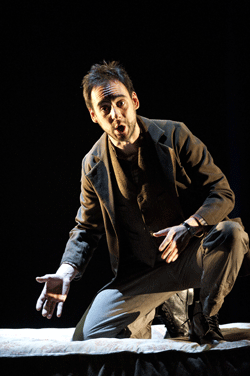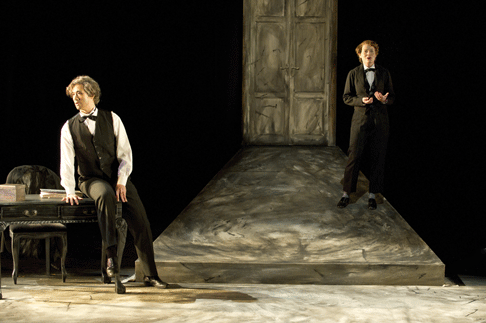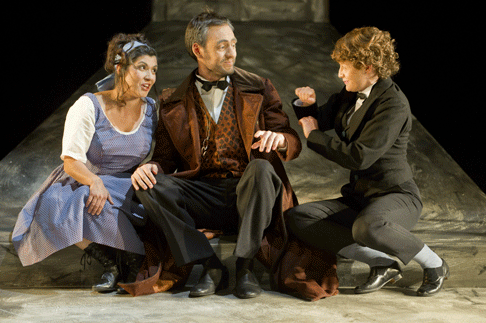Recently in Performances
English Touring Opera are delighted to announce a season of lyric monodramas to tour nationally from October to December. The season features music for solo singer and piano by Argento, Britten, Tippett and Shostakovich with a bold and inventive approach to making opera during social distancing.
This tenth of ten Live from London concerts was in fact a recorded live performance from California. It was no less enjoyable for that, and it was also uplifting to learn that this wasn’t in fact the ‘last’ LfL event that we will be able to enjoy, courtesy of VOCES8 and their fellow vocal ensembles (more below …).
Ever since Wigmore Hall announced their superb series of autumn concerts, all streamed live and available free of charge, I’d been looking forward to this song recital by Ian Bostridge and Imogen Cooper.
Although Stile Antico’s programme article for their Live from London recital introduced their selection from the many treasures of the English Renaissance in the context of the theological debates and upheavals of the Tudor and Elizabethan years, their performance was more evocative of private chamber music than of public liturgy.
Evidently, face masks don’t stifle appreciative “Bravo!”s. And, reducing audience numbers doesn’t lower the volume of such acclamations. For, the audience at Wigmore Hall gave soprano Elizabeth Llewellyn and pianist Simon Lepper a greatly deserved warm reception and hearty response following this lunchtime recital of late-Romantic song.
For this week’s Live from London vocal recital we moved from the home of VOCES8, St Anne and St Agnes in the City of London, to Kings Place, where The Sixteen - who have been associate artists at the venue for some time - presented a programme of music and words bound together by the theme of ‘reflection’.
'Such is your divine Disposation that both you excellently understand, and royally entertaine the Exercise of Musicke.’
‘And there was war in heaven: Michael and his angels fought against the dragon; and the dragon fought and his angels, And prevailed not; neither was their place found any more in heaven … that old serpent … Satan, which deceiveth the whole world: he was cast out into the earth, and his angels were cast out with him.’
There was never any doubt that the fifth of the twelve Met Stars Live in Concert broadcasts was going to be a palpably intense and vivid event, as well as a musically stunning and theatrically enervating experience.
‘Love’ was the theme for this Live from London performance by Apollo5. Given the complexity and diversity of that human emotion, and Apollo5’s reputation for versatility and diverse repertoire, ranging from Renaissance choral music to jazz, from contemporary classical works to popular song, it was no surprise that their programme spanned 500 years and several musical styles.
The Academy of St Martin in the Fields have titled their autumn series of eight concerts - which are taking place at 5pm and 7.30pm on two Saturdays each month at their home venue in Trafalgar Square, and being filmed for streaming the following Thursday - ‘re:connect’.
The London Symphony Orchestra opened their Autumn 2020 season with a homage to Oliver Knussen, who died at the age of 66 in July 2018. The programme traced a national musical lineage through the twentieth century, from Britten to Knussen, on to Mark-Anthony Turnage, and entwining the LSO and Rattle too.
With the Live from London digital vocal festival entering the second half of the series, the festival’s host, VOCES8, returned to their home at St Annes and St Agnes in the City of London to present a sequence of ‘Choral Dances’ - vocal music inspired by dance, embracing diverse genres from the Renaissance madrigal to swing jazz.
Just a few unison string wriggles from the opening of Mozart’s overture to Le nozze di Figaro are enough to make any opera-lover perch on the edge of their seat, in excited anticipation of the drama in music to come, so there could be no other curtain-raiser for this Gala Concert at the Royal Opera House, the latest instalment from ‘their House’ to ‘our houses’.
"Before the ending of the day, creator of all things, we pray that, with your accustomed mercy, you may watch over us."
The doors at The Metropolitan Opera will not open to live audiences until 2021 at the earliest, and the likelihood of normal operatic life resuming in cities around the world looks but a distant dream at present. But, while we may not be invited from our homes into the opera house for some time yet, with its free daily screenings of past productions and its pay-per-view Met Stars Live in Concert series, the Met continues to bring opera into our homes.
Music-making at this year’s Grange Festival Opera may have fallen silent in June and July, but the country house and extensive grounds of The Grange provided an ideal setting for a weekend of twelve specially conceived ‘promenade’ performances encompassing music and dance.
There’s a “slide of harmony” and “all the bones leave your body at that moment and you collapse to the floor, it’s so extraordinary.”
“Music for a while, shall all your cares beguile.”
The hum of bees rising from myriad scented blooms; gentle strains of birdsong; the cheerful chatter of picnickers beside a still lake; decorous thwacks of leather on willow; song and music floating through the warm evening air.
Performances
![Hannah Hipp [Photo © The Royal Opera / Richard Hubert Smith]](http://www.operatoday.com/JPYA_LES-NUITS-DETE-01.gif)
26 Oct 2011
A Portrait of Manon — Young Artrists at the Royal Opera House
Without young artists, no art form will thrive or grow. The Royal Opera House’s Jette Parker Young Artists scheme nurtures the best from its young artists that their performances attract thoughtful audiences.
All members of the Royal Opera House Young Artists scheme are professionals, not students, and have extensive experience even before they come, as former Young Artist Simona Mihai put it “to be polished like gemstones”. Graduates of the scheme include Marina Poplavskaya, Jacques Imbrailo and Ekaterina Gubernova.
Most of the Young Artists are singers, but the scheme also covers other aspects of opera-making. The singers, directors and conductors in the scheme created this special performance of Massenet Le Portrait de Manon and Berlioz Les Nuits d'été to demonstrate their skills.
 Pablo Bemsch
Pablo Bemsch
Massenet composed Le Portrait de Manon in 1894 as a one-act sequel to Manon. It is an excellent choice, coming after the Royal Opera House productions of Manon and Cendrillon. Knowing the background is valuable, as Le Portrait de Manon is essentially an epilogue to Manon. However, this Young Artists production was good enough that it could stand on its own.
Des Grieux (Zhengzhong Zhou) has grown old and bitter, so trapped in his grief that he's irritated when his lively young nephew Jean (Hanna Hipp) falls in love and wants to marry. The set (Sophie Mosberger) is very well designed, emphasizing Des Grieux's isolation, despite the trappings of wealth. There's a long rumination, in which Des Grieux sings about his past. Zhengzhong Zhou worked two years in France, and sang Valentin in Gounod's Faust earlier this month, so although he's only 27, he characterized Des Grieux's personality with emotional depth. His makeup was so well done, he looked as mature as he sounded. Pablo Bemsch, as Tiberge, Des Grieux's friend, was also very convincing, extending our sympathy with the predicament. Des Grieux isn't being unreasonable when he opposes Jean's marriage: perhaps he doesn't want the young man to be hurt as he was.
 Zhengzhong Zhou as Des Grieux and Hannah Hipp as Jean
Zhengzhong Zhou as Des Grieux and Hannah Hipp as Jean
Love and youth will triumph, after all, as this is opera. Hanna Hipp is one of this year's new members of the Young Artists scheme, but she impressed greatly even as a student several years ago at the Guildhall School of Music and Drama. Here she's a vivacious young scamp in trousers. Maybe Des Grieux is right, Jean's too young to be tied down. But Hipp and Aurore (Susana Gaspar) are spirited, and their confidence in their roles makes the resolution inevitable. Stunned by Aurore's appearance, dressed as Manon, Des Grieux remembers and relents. If Manon the opera is tragic, Le Portrait de Manon is an invigorating romp, and in this performance, deftly executed.
Berlioz’s Les Nuits d'été is a song cycle, and even in the 1856 orchestral transcription heard here, doesn't transfer easily to the stage. In theory, there's no reason why not, and the undercurrent of dream unifies the group of songs. While the staging for Le Portrait de Manon was concise, enhancing, adding to meaning, the staging for Les Nuits d'été was clumsy. One bed might have sufficed. These songs express states of mind, not different characters.
 Hannah Hipp as Jean, Pablo Bemsch as Tiberge and Susana Gaspar as Aurore
Hannah Hipp as Jean, Pablo Bemsch as Tiberge and Susana Gaspar as Aurore
Pablo Bensch had been interesting as Tiberge earlier, so I was looking forward to his Villanelle. Unfortunately orchestra and singer weren't properly aligned, the winds entering insensitively, throwing the vocal line off kilter. Fortunately, Bemsch was better supported in Au Cimitiere. Hanna Hipp and Susana Gaspar sang the other songs. The balance was good, making a case for mixed voices. Berlioz sanctioned this, but it's usually impractical in recital — another good reason for paying attention to Young Artists Events, where repertoire is often approached in interesting ways.
Anne Ozorio
![Hannah Hipp [Photo © The Royal Opera / Richard Hubert Smith]](http://www.operatoday.com/JPYA_LES-NUITS-DETE-01.gif)


